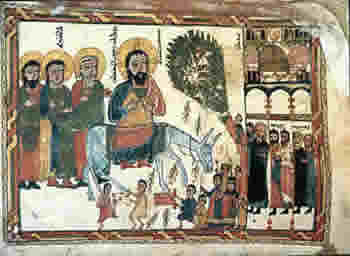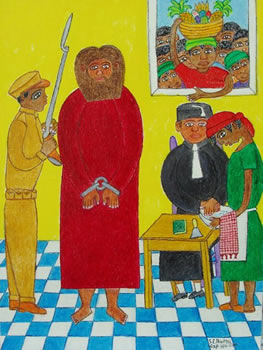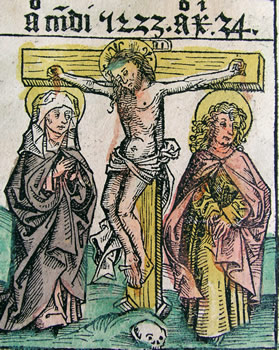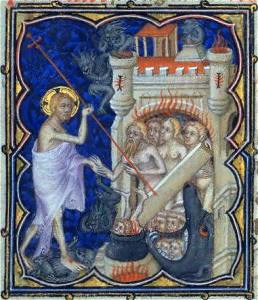From Our Archives
For other essays on this week's texts, see the essays by Debie Thomas: A Crucified God (2020), and The Clown King (2015),
For Sunday April 2, 2023
The Sixth Sunday in Lent
Lectionary Readings (Revised Common Lectionary, Year A)
Isaiah 50:4–9a
Psalm 31:9–16
Philippians 2:5–11
Matthew 26:14–66 or 27:11–54
NOTE: the readings for Palm Sunday and Passion Sunday differ slightly. The essay this week can be used as a personal meditation or a liturgical - antiphonal reading.
This Week's Essay
"See, your king comes to you, gentle and riding on a donkey."
A king on a donkey? A prophetic act of political parody signals a different kind of kingdom.
"At first his disciples did not understand all this."
A recurrent theme throughout the gospels, so don't be too hard on yourself.
"As he approached Jerusalem and saw the city, he wept over it and said, 'If you, even you, had only known on this day what would bring peace.'"
More critical than at any time in our history — what will bring peace?
"You did not recognize the time of God's coming to you."
A terrifying thought, then and now.
The whole city of Jerusalem asked, "Who is this?"
The ultimate question that is still contested.
Children shouting in the temple: "Hosanna to the Son of David."
The littlest and the best.
"By what authority do you do these things?"
A trick question elicits a trick answer.
 |
|
Triumphal Entry.
|
"Keeping a close watch on him, they sent spies, who pretended to be honest. They hoped to catch Jesus in something he said."
But Jesus "saw through their duplicity." And ours, too.
Jesus said, "I tell you the truth, the tax collectors and prostitutes are entering the kingdom of God before you."
So are all the groups that we love to hate. The religious insiders didn't believe it then; and we don't believe it now.
The chief priests and elders "plotted to arrest Jesus in some sly way and kill him."
After thirty years of total obscurity, then three years of prophetic ministry, it's hard to imagine how one person caused so much political and religious turmoil.
At the last supper "a dispute arose among them as to which of them was considered to be the greatest."
At the Last Supper? Our vanity knows no boundaries.
"I tell you the truth, one of you will betray me."
Judas plays our part and takes our place.
"One by one they said to him, 'surely not I?'"
Yes, surely it is me and you.
"This very night you will all fall away on account of me."
Everyone promised loyalty, but no one gave it.
Peter: "Even if all fall away, I never will, even if I have to go to prison with you and die with you."
Enthusiasm and earnestness without enlightenment spell disaster.
"And all the other disciples said the same."
Which means that Judas and Peter are unexceptional.
 |
|
Jesus before Pilate, Seymour E. Bottex, Haiti.
|
"What is written about me is reaching its fulfillment."
Divine fulfillment, not political fate.
In Gethsemane, "all the disciples deserted him and fled."
Utterly alone in the violent world.
"Every day I was in the temple courts, and you did not lay a hand on me. But this is your hour — when darkness reigns."
We shouldn't deny that sometimes darkness reigns.
The high priest asked, "are you the Christ, the Son of God?"
Yes. Full stop.
A servant girl: "You also were with that Nazarene, Jesus."
Peter: "I don't know or understand what you're talking about."
Jesus: "The Lord turned and looked straight at Peter."
A look of compassion, not of condemnation.
"Peter broke down and wept bitterly."
"Judas was seized with remorse and returned the thirty pieces of silver."
Two betrayals, two regrets.
"They bound Jesus, led him away and handed him over to Pilate."
Rendition, interrogation, torture and execution by the Roman state.
"We found this man subverting our nation."
True enough! And not only their nation, but ours, too.
"We found this man forbidding to pay taxes to Caesar."
One of the most explosive and least remembered charges against Jesus.
"My kingdom is not of this world. It is from another place."
Our call and challenge: to love the world but not its worldliness.
Pilate: "Are you the king of the Jews?"
Jesus: "Yes, it is as you say. For this reason I was born, to testify to the truth."
"What is truth?"
The truth is often more than we can bear.
 |
|
Crucifixion.
|
"I find no basis for a charge against this man." So he sent him to Herod.
Detaining the innocent without charges has a long history.
Pilate's wife: "Don't have anything to do with that innocent man, for I have suffered a great deal today in a dream on account of him."
An anxiety dream comes true.
Herod "plied him with many questions, but Jesus gave him no answer."
Not the slightest effort to defend himself.
Back before Pilate: "I have examined him in your presence and have found no basis for your charges against him. Neither has Herod."
When the mob raged, Pilate capitulated: "Here is your king!"
"We have no king but Caesar!"
A depressing admission of a political truth—caesar is our lord.
"They all condemned him as worthy of death," so "Pilate had Jesus flogged, and handed him over to be crucified."
Scape-goating the innocent.
The soldiers mocked him, "Hail, king of the Jews! Prophesy!"
So close to the kingdom, but the soldiers were clueless.
"When they had crucified him, they divided up his clothes by casting lots."
So strange, God's subtlety — the redemption of the world in a subordinate clause.
And for the soldiers, just another day of graft.
"Those who passed by hurled insults."
Despised and rejected to the bitter end.
"My God, my God, why have you forsaken me?"
The suffering servant of the grieving God.
"Father, it is finished, into your hands I commit my spirit." "With a loud cry, Jesus breathed his last. He gave up his spirit."
The end of his human life fulfilled a divine call.
 |
|
Harrowing of Hell.
|
The Roman centurion exclaimed, "surely this man was the Son of God!"
A warrior's confession of the Prince of Peace.
"Many women were there," including "his mother's sister."
There were "many women" who supported Jesus from start to finish.
"A rich man from Arimathea named Joseph took Jesus's body, wrapped it in a clean linen clothe, and placed it in his own new tomb."
It might feel good to scorn the rich, but it's a sign of sanctimony.
"Mary Magdalene and Mary the mother of Joses saw the tomb and how the body was laid."
The last at the cross will be the first at the resurrection.
Weekly Prayer
Malcolm Guite
Now to the gate of my Jerusalem,
The seething holy city of my heart,
The saviour comes. But will I welcome him?
Oh crowds of easy feelings make a start;
They raise their hands, get caught up in the singing,
And think the battle won. Too soon they’ll find
The challenge, the reversal he is bringing
Changes their tune. I know what lies behind
The surface flourish that so quickly fades;
Self-interest, and fearful guardedness,
The hardness of the heart, its barricades,
And at the core, the dreadful emptiness
Of a perverted temple. Jesus comeBreak my resistance and make me your home.
Dan Clendenin: dan@journeywithjesus.net
Image credits: (1) Christopher Haas, Department of History, Villanova University; (2) Arte del Pueblo: Latin American & European Arts; (3) Morse Library, Beloit College; and (4) Wikipedia.org.



